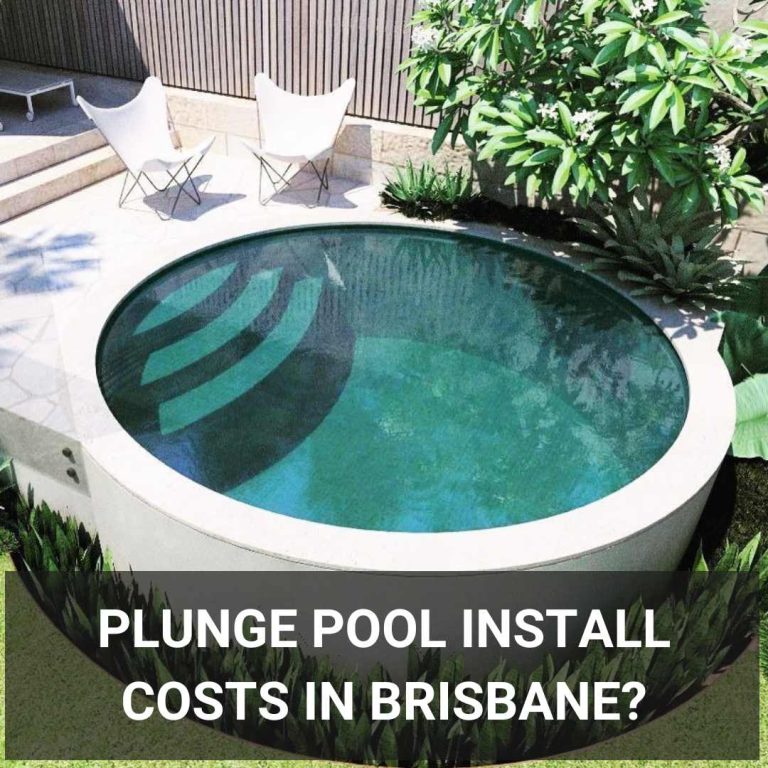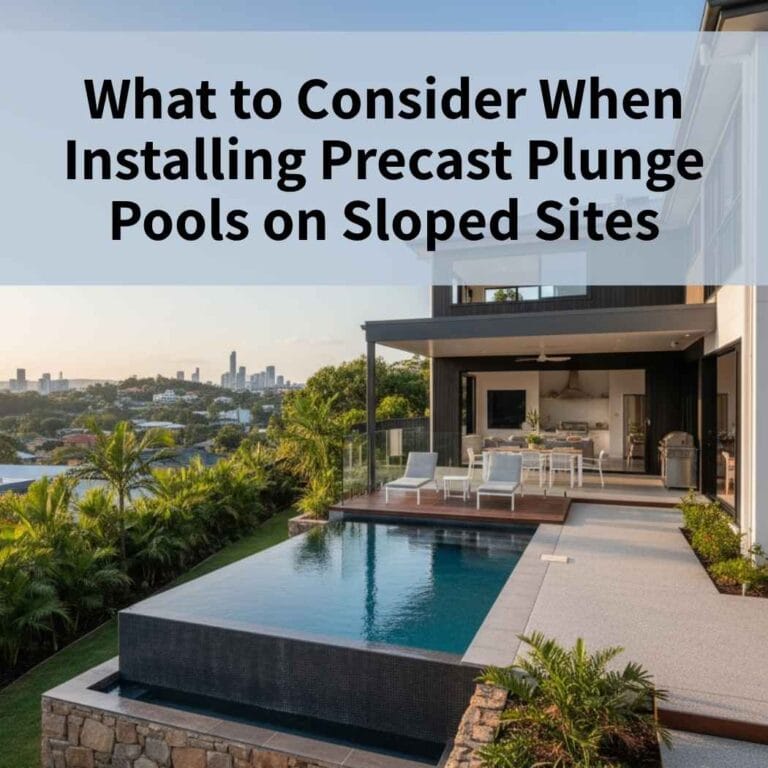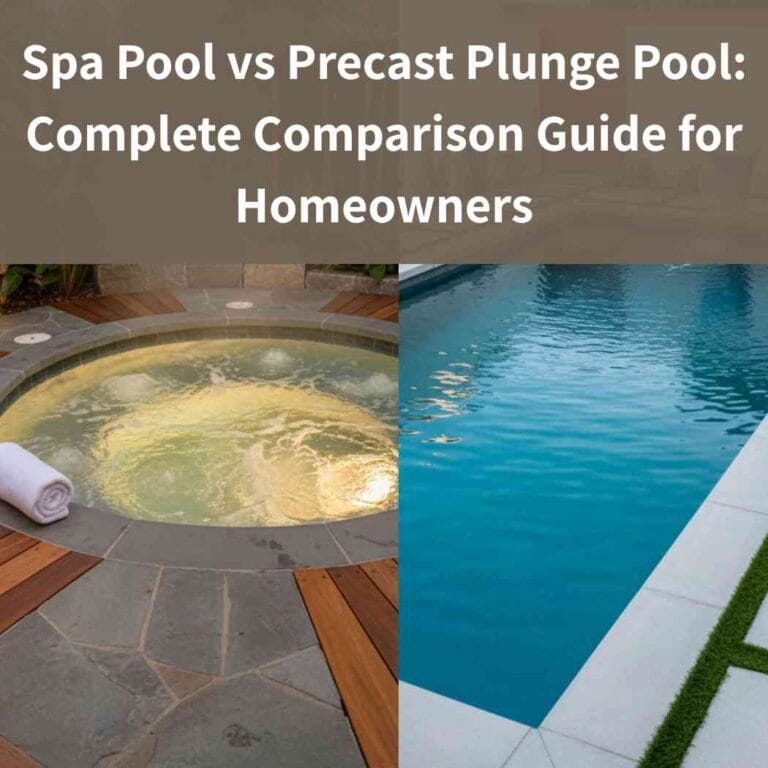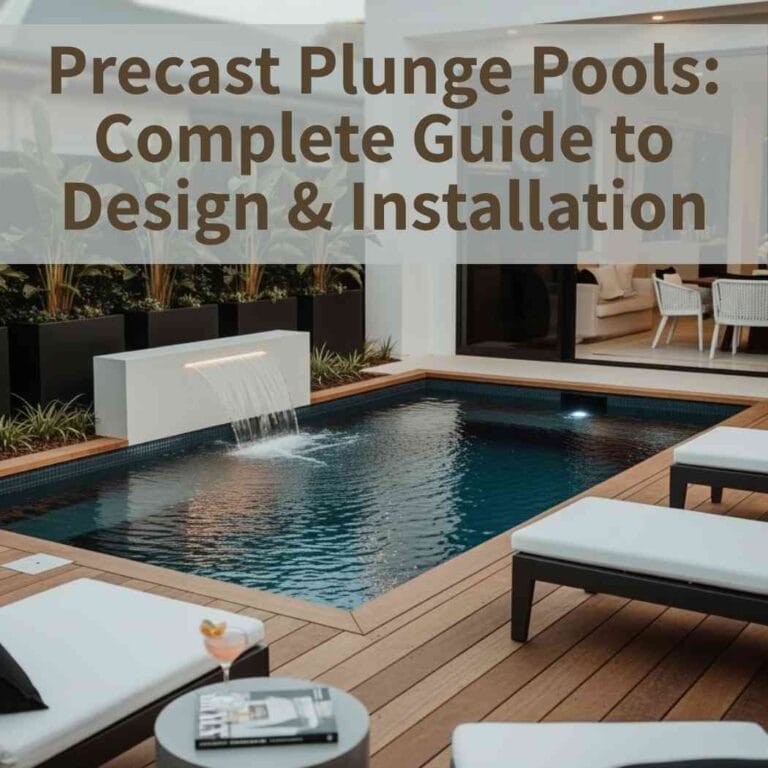At Plunge Pools Brisbane, we help homeowners design and install plunge pools that look great and meet every Queensland Government safety rule. With years of experience, our team understands both the building process and the compliance steps. That means you can enjoy your pool without stress.
This guide gives Brisbane homeowners a clear breakdown of pool compliance. You’ll learn about:
- Fencing rules and CPR signage
- Permits and inspections
- Registration and resale obligations
By the end, you’ll know exactly how to keep your pool compliant and why it matters for your family’s safety and peace of mind.
Table of Contents
ToggleWhy Pool Safety Compliance Matters in Queensland
Queensland’s pool safety regulations are life-saving standards that help protect children, reduce accidents, and enhance property value.
1. Child Safety First
Proper pool fencing and self-closing gates are proven to reduce the risk of drowning, especially for young children. By maintaining compliant barriers, parents and caregivers reduce the chances of unsupervised access and life-threatening accidents.
2. Legal Compliance and Protection
Property owners are legally required to meet Queensland’s pool safety standards. Failure to comply can result in significant fines, legal liability, or even court action in the event of an accident. A valid pool safety certificate provides peace of mind and ensures you’re on the right side of the law.
3. Boosting Property Value and Sale Readiness
For homeowners looking to sell, a current pool safety certificate is often required before settlement. It helps streamline the selling process and reassures buyers that the property meets Queensland’s rigorous safety standards that will potentially increase buyer interest and property value.
Do Plunge Pools Count as Pools Under Queensland Law?
Yes. Plunge pools are treated the same as any other pool. In Queensland, any body of water deeper than 300mm (about the height of a ruler) must comply with the pool requirements.
This means even a compact plunge pool in your backyard must follow the same rules as a large swimming pool. If you’re dreaming of a stylish new pool for your outdoor space, you’ll need to plan for fencing, signage, and approvals right from the start.
Key Pool Safety Standards in Queensland
Queensland’s pool rules are based on the AS 1926.1 safety standard, which sets out how fences, gates, and barriers must be built and maintained. If your plunge pool is deeper than 300mm, these rules apply.
Main Pool Safety Rules
Call us today: 07 3522 2949
Extra safety gear like alarms, rescue hooks, and childproof spa jets can give families added peace of mind, but they don’t replace the legal fence requirements.
Permits, Approvals, and Safety Inspections
Before building a plunge pool in Brisbane, you must secure building approval. This process handled by your local council or a licensed private certifier to ensure your pool complies with Queensland’s safety and construction regulations from start to finish
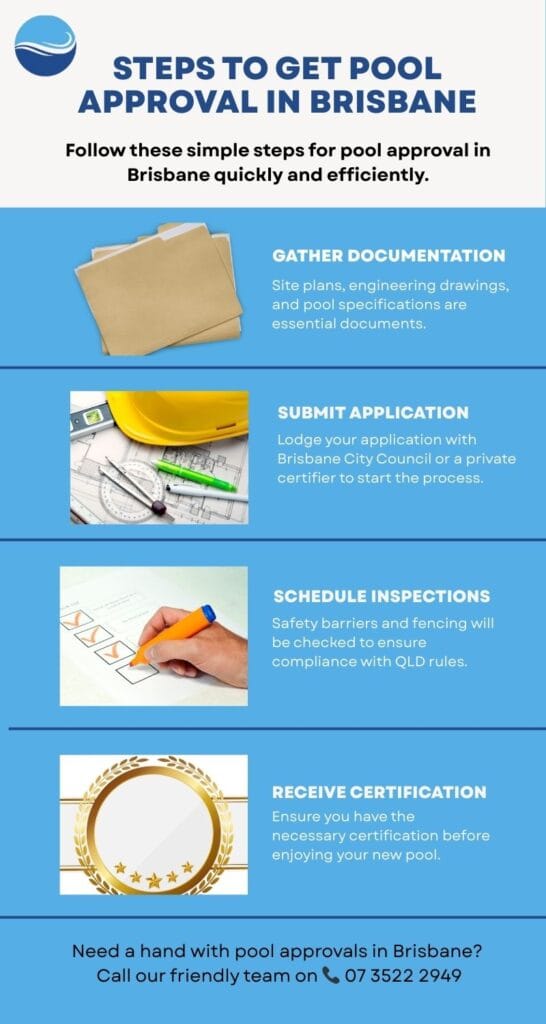
Pro Tip: Start the approval process early and keep your documentation organised to avoid project delays or failed inspections.
Registering Your Plunge Pool in Queensland
After your plunge pool is complete and certified, it must be registered with the Queensland Building and Construction Commission (QBCC) Pool Safety Register. This step is mandatory under Queensland law and applies to all residential pools, including plunge pools, spas, and temporary pools deeper than 300mm.
Why Registration Matters
Registering your pool helps Queensland authorities maintain accurate safety records and ensures that all properties with pools meet legal safety obligations. Failing to register can result in penalties of up to $2,356.
How to Register
The process is simple and can be completed online in just a few minutes via the QBCC website. You’ll need:
- Property address details
- Pool type and location
- Safety certificate information (if available)
Common Mistakes to Avoid
- Failing to register: This is one of the most frequent and costly oversights.
- Incorrect property details: Typos or outdated records can lead to registration issues.
- Late registration: This can trigger fines and delay compliance approvals.
Tip: Always double-check your information before submission to avoid unnecessary delays or penalties.
Common Mistakes Homeowners Make with Pool Safety
Even well-intentioned homeowners can overlook critical safety and legal requirements when installing or maintaining a plunge pool in Queensland. These mistakes not only pose safety risks especially for young children but can also result in non-compliance fines from local authorities or the QBCC.
Top Pool Safety Mistakes to Avoid
- Obstructing the Pool Fence
Placing BBQs, outdoor furniture, pot plants, or decorative features too close to the fence can create climbable objects, making it easier for children to gain access. Queensland law requires a clear 900mm non-climbable zone around the outside of the fence. - Missing or Incorrect CPR Signage
Every pool must have a visible and durable CPR (Cardiopulmonary Resuscitation) sign that complies with Queensland guidelines. It’s a legal requirement and must be clearly displayed near the pool typically on the inside of the fence or another visible area. - Faulty or Non-Compliant Pool Gates
Gates must self-close and self-latch from any position without manual force. Faulty latches or heavy gates that don’t shut completely are common causes of non-compliance. - Neglecting Pool Registration
Homeowners often forget to register their plunge pool with the QBCC Pool Safety Register, especially after DIY builds or minor renovations. Unregistered pools can attract significant penalties and may delay property sales.
Tip: Use a post-installation pool safety checklist and conduct periodic inspections to ensure your pool remains compliant year-round.
Insurance, Liability, and Resale Implications
A non-compliant plunge pool can affect both your insurance cover and your home’s resale value.
- Insurance exclusions: If your pool doesn’t meet Queensland’s safety rules, insurers may reject claims for accidents or damage.
- Resale impact: You must provide a valid Pool Safety Certificate when selling your home. Without it, buyers may walk away or ask for a lower price.
- Legal risk: Owners can also face liability if someone is injured in or around a non-compliant pool.
Staying compliant protects your family, your finances, and your property value.
Pool Safety Certificate
APool Safety Certificate is an official document that confirms your plunge pool complies with Queensland’s pool safety standards, specifically those outlined under AS 1926.1. It is issued by a licensed pool safety inspector following a physical inspection of your pool barrier system and safety features.
Key Details About the Pool Safety Certificate
When You Need One
A Pool Safety Certificate is required before selling or leasing any residential property with a pool. It must be presented during contract signing or prior to lease agreements. Failing to provide a valid certificate can delay settlement or breach tenancy regulations.
What’s Inspected
The certificate is only issued once all of the following elements meet compliance:
- Fencing and barriers: Height, gaps, and climbable zones
- Gates and latches: Must self-close and self-latch properly
- CPR signage: Clearly visible, durable, and meets AS 1926.1 placement rules
- Access points: No direct access from dwellings unless compliant doors are fitted
Inspection Cost
Prices generally range from $150 to $300, depending on your location, property complexity, and whether re-inspections are needed.
Expiry and Validity
- For non-rental properties, the certificate remains valid indefinitely—unless the pool barrier is altered.
- For rental properties, it remains valid for 1 year from the date of issue, after which a new inspection may be required.
Tip: Store your certificate in a secure place and have a digital copy available. Real estate agents, buyers, or property managers will request it during property transactions or rental renewals.
Consequences of Non-Compliance
Ignoring Queensland’s pool safety rules can lead to serious problems for homeowners.
Possible consequences include:
- Fines: Penalties can reach thousands of dollars.
- Stop-work orders: Projects may be delayed until safety issues are fixed.
- Pool removal: In extreme cases, councils can order a pool to be taken out.
- Legal action: Injuries around a non-compliant pool can bring liability claims.
Staying compliant is always easier and cheaper than paying fines or facing legal trouble later.
Tips for Smooth Compliance When Installing a Plunge Pool
Staying on top of safety rules is simple if you plan ahead. A few smart steps will save you time, money, and stress.
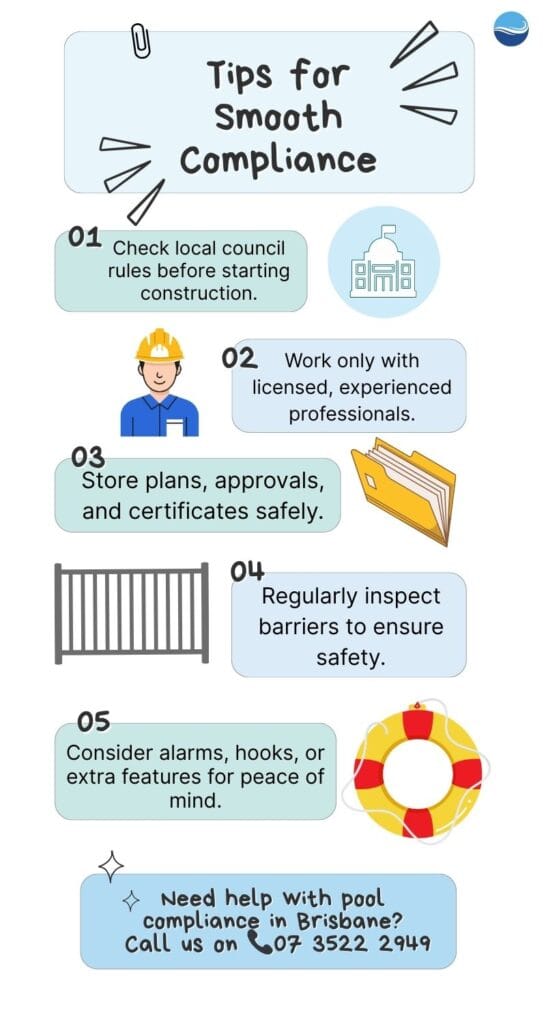
Homeowner compliance checklist:
✔ Fence at least 1200mm high
✔ No climbable objects within 900mm
✔ Self-closing, self-latching gate
✔ CPR sign displayed clearly
✔ Pool registered with QBCC
✔ Pool Safety Certificate if renting or selling
Following this checklist means your plunge pool will be safe, legal, and ready to enjoy.
Conclusion
Installing a plunge pool in Brisbane is a great way to enjoy the warm climate and add value to your home. But it also comes with responsibilities. Queensland’s safety laws are strict, and following them protects your family, your property, and your peace of mind.
At Plunge Pools Brisbane, we make the process simple. Our team handles design, approvals, and installation so your new pool is safe, compliant, and ready to enjoy.
Ready to get started? Reach out to us today for expert advice, design support, and a free quote.
FAQs
Do I need a pool safety certificate before I can use my plunge pool in Queensland?
Yes. You must have a validPool Safety Certificate before using your plunge pool. A licensed inspector checks your fence, gate, and CPR sign to make sure they meet Queensland standards. The certificate is also required when selling or renting your home.
Who is responsible for ensuring pool compliance — the homeowner or the installer?
The homeowner is legally responsible for pool compliance in Queensland. Installers must follow rules during construction, but the owner must maintain fences, gates, and signage at all times. Failing to do so can lead to fines and legal liability.
Are there specific safety rules for plunge pools on small or narrow blocks?
Yes. Pool laws apply to all properties, even small or narrow ones. Plunge pools must still meet fence height, gate, and non-climb zone rules. Many owners choose glass fencing or boundary-aligned barriers to stay compliant without losing valuable space.
Can I install smart technology (like alarms or covers) to improve safety compliance for my plunge pool?
Yes, but smart devices are only extra protection. Alarms, motion sensors, or automatic covers do not replace Queensland’s fencing laws. These tools work best as a second layer of safety, especially for families with kids or pets.
Are there expected future changes to Queensland pool safety regulations that homeowners should prepare for?
Possible future changes may include more frequent barrier inspections and use of digital compliance registers. Some experts also expect rules on smart safety features to tighten. Homeowners should check the QBCC website for the latest updates.

